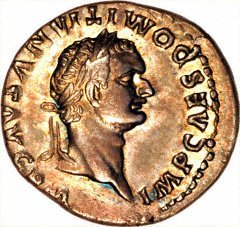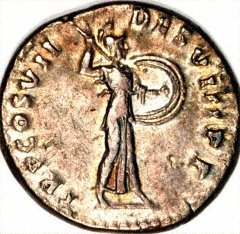| The Very Highest Quality Roman Portraits... |
| Portrait Gallery of Roman Emperors |
 | |
 | |
Domitian was the younger son of the Emperor Vespasian and Flavia Domitalla. After the death of his elder brother Titus in 81 AD, he succeeded to the throne unopposed. Although at first promising, he was unpopular among the nobles of the senate, which resulted in numerous plots and conspiracies. Domitian was suspicious by nature and reacted violently. The last years of his reign were marked by terror and oppression. He was murdered on 18th September in a plot involving his wife Domitia, his chamberlain, and the Praetorian Prefect.
Early Years
Born in Rome on 24th October AD51, Titus Flavius Domitianus was the youngest son of Vespasian, emperor from AD69-79. During the reigns of his father and brother Titus (AD79-81), Domitian was deliberately kept in the background. Although he was not educated at the emperor's court like Titus, Domitian did receive sound training in Rome in the same way as any member of the senatorial elite of his day. The imperial biographer Suetonius records that Domitian gave public recitals of his works and conversed eloquently with ambassadors and dignitaries at court. Domitian's mother died when he was young and his father and brother were absent for many of Domitian's formative years. An outcome of all this was his preference for his own company at the expense of his social skills. This trait was to have dire consequences for his later years as emperor.
Domitia
In AD70, Domitian married Domitia Longina, daughter of the highly respected general, Gnaeus Domitius Corbulo, whom Nero had forced to commit suicide in AD66. It was an excellent choice for the 19-year old Domitian; Corbulo had been a popular general and his family was very well connected at court. However, the marriage was not happy, especially after an only child died young. Domitia was exiled by her husband in AD83 but she was quietly recalled by the emperor after a short time. However, the relationship had deteriorated to such an extent that Domitia was even implicated in the assassination of her husband in AD96.
A Slow Rise to Power...
Domitian was denied real power during the reigns of his father and brother which embittered his relations with the Senate and court. He was given a succession of minor priesthoods and junior honorary roles. Not surprisingly, Domitian was never close to his brother and when Titus lay dying in September AD81, Domitian rushed off to the praetorian camp in Rome where he was hailed as emperor! On the news of Titus' death, the Senate delayed the acknowledgement of Domitian before it honoured the dead emperor, an early indication of Domitian's future problems with the aristocracy!
A Tyrannical Despot or Misunderstood Benefactor?...
Domitian's fifteen year reign has traditionally been described as a period when the citizens of Rome and the senators lived in constant fear of their lives. The emperor was described as a disturbed megalomaniac who believed that everybody hated him. Recently, however, there has been a major revision of these opinions. Domitian had not been groomed for power and his mistrust of the Senate and courtiers must be connected to this lack of confidence. Modern scholars now believe that he set out to be a wise ruler but his inexperience and lack of tact and diplomacy turned him into a suspicious autocrat.
Domitian fine-tuned the economy, increased food production and improved the conditions of the private soldier. He had varied success with these reforms but he was most successful with the army. The legions held him in great affection and he led several military expeditions on the Danube against the Dacians. He launched a grand building programme in Rome, erecting, restoring, or completing almost 50 buildings, including the restored Temple of Jupiter on the Capitol and a magnificent palace on the Palatine. Domitian offered frequent and elaborate public shows, always with an emphasis on originality: gladiator contests held at night; female gladiatrices and dwarves; food showered down upon the public from ropes stretched across the top of the Amphitheatre. Less easy to estimate is the emperor's attitude toward Christians and Jews since reliable evidence for their persecution is difficult to find. Overall, the tradition of Domitian as a mindless persecutor has been greatly overstated, yet given his autocratic and selfish tendencies and his devotion to Roman pagan religion, it is easy to see how such stories could have evolved and multiplied.
The Enigma of Domitian Domitian's centralized and autocratic tendencies meant that the real seat of power during his reign centred on his court. Courtiers included family members and freedmen, as well as friends, politicians, generals and praetorian prefects who offered advice on important matters. This arrangement was not new but it emphasized Domitian's mistrust of the Senate and aristocracy. Senatorial dislike of Domitian was not unfounded for at least 11 senators of consular rank were executed and many others exiled. The senate's enthusiastic support for the damning of Domitian's memory, therefore, came as no surprise. However, the facts should be placed in context. The emperor Claudius (AD41-54) executed 35 senators and nearly 300 equestrians yet he was still deified by the senate! Domitian's gravest mistake was that he made no effort to disguise his feelings about the Senate. Domitian saw no need to consult the Senate and he treated it with obvious contempt. Senatorial revenge came in the form of an aristocratically based literary tradition that missed no opportunity to destroy the emperor's reputation and his rule. Assassination... On 18 September AD96, Domitian fell victim to a palace plot. He was stabbed in the neck by a steward as he was reading a report. Tradition says that the emperor knew of threats against his life and he had installed a series of mirrors in the palace to see who was approaching him! The sources are unanimous in stressing that Domitian was murdered by lowly servants and officials; what they had to gain from Domitian's death is difficult to determine so there may have been a larger and more influential core of conspirators behind the plot. What can be said with certainty is that the ultimate truths of his reign remain shrouded in mystery...
Inverted Inscription - Anticlockwise & Retrograde
The coins of Domitian are interesting for a feature of the lettering. It appears inverted, so that one needs to read it from around the outside of the coin, rather from the inside. This is hard to explain, but easier to express if it is considered as being anticlockwise. Domitian was the last emperor with this arrangement of the inscription, but it had been fairly common during the first century.
Lettering readable from the outside of the coin is known as retrograde.
81 - 82 AD
Although this coin is undated, it was issued in 81 AD, or possibly 82, as we can tell from the legend (inscription) on the reverse which reads: TR P II COS VII DES VIII PP. He had already been elected Consul 7 times when he acceded in AD 81, and 8 times in 82 AD, the DES stands for DESIGNATUS, meaning designate. This coin would have been produced between the time the comitia elected him for the eight time, and the starting date of his eight term of Consulship.
The reverse of the coin shown features Minerva standing right holding spear and shield.
Roman Emperors Portrait Gallery
You may wish to visit our portrait gallery of Roman emperors. Although it is not complete, we add new and better coins when we can. We are always keen to buy superior quality Roman coins to upgrade our photo gallery.
| ...at the Lowest Possible Price |
|
32 - 36 Harrowside, Blackpool, Lancashire, FY4 1RJ, England. Telephone (44) - (0) 1253 - 343081 ; Fax 408058; E-mail: info@chards.co.uk The URL for our main page is: https://24carat.co.uk Chard(1964) Ltd |